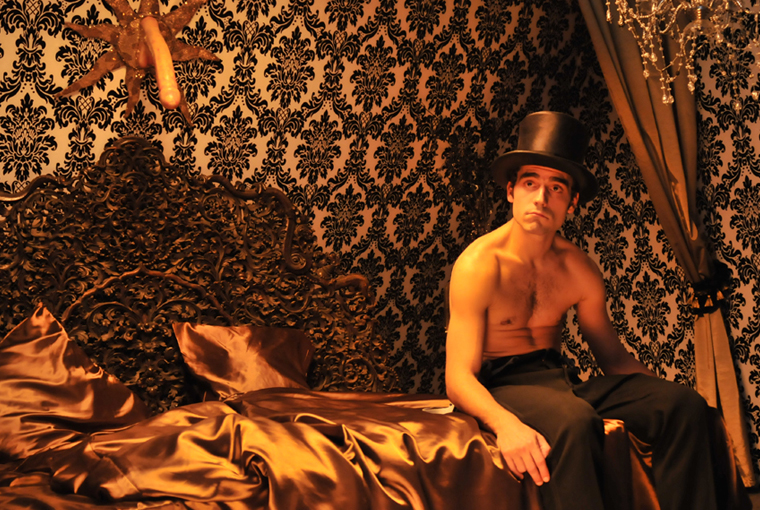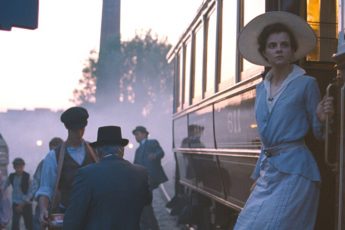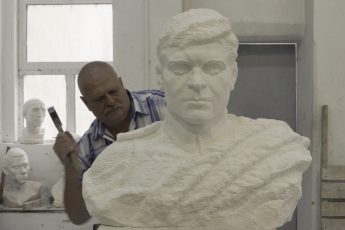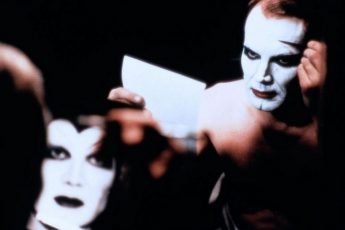Fantasy and Truth
Szabolcs Hajdu’s Bibliotheque Pascal (2010)
Vol. 13 (January 2012) by Konstanty Kuzma
Stunned by the unseizable magic that had struck me after first seeing Fellini’s 8½ (I was about 15 then), I got a VHS copy of La Dolce Vita and Nights of Cabiria from a friend soon thereafter, hopefully awaiting the extension of a world that I had blindly embarked on. Whereas – aside from its length -, La Dolce Vita had much to give, since I was then boyish enough to enjoy the shiny world that La Dolce Vita is set in (though, I must admit, that world seems just as magnetic today), Nights of Cabiria was a grave disappointment. Not only had I trouble identifying with Giulietta Masinna’s claimant character (Cabiria) and accepting the lack of Marcello Mastroianni. I was also put off by the fairytale-like air that rested over large parts of the film. I felt skeptical (or felt like skepticism was the right thing to summon) about the glorification of Cabiria’s life, a prostitute whose misery on screen seemed limited to an inadvertent bath in the river, and a scene in a circus-like theater where she becomes an object of public ridicule. Years later I found out that the copy I had gotten hold of was incomplete. Sometime after Cabiria says goodbye to Wanda at the bus stop, off to marry her “great love,” the VHS noise leads over to colorful commercials. Accepting the premature farewell at the bus stop as a typical ending, I never inquired whether I had actually seen the whole film. In consequence, for years I had thought that the film has a happy end, overlooking the fact that Cabiria’s miracle man turns out to be just another sham (which, upon discovery, of course was an enormous surprise to me).
Seeing Bibliotheque Pascal, written and directed by Szabolcs Hajdu, reminded me of this little episode, because in many ways, it deals with the same dilemma I encountered when viewing Nights of Cabiria disposed of its finale: how does one make the split between authenticity and artistic vision? Evidently, this problem does not apply to any subject, and even so, I am sure Fellini was less concerned with it than Hajdu was when making his piece. But any director who makes a film about (or dealing with) a theme as serious as prostitution will have to face the fact that there are usually certain expectations that the audience and critics hold towards the film. Furthermore, both movies were conceived in contexts were directors sought after a particular sensibility for realism: Fellini’s early films emerged as part of the Italian Neo-Realism, and though Hajdu seems to be going his own way, many viewers will recognize themes from the Romanian New Wave in the Romanian-Hungarian production.
Bibliotheque Pascal tells the tale of Mona, a single mother who falls victim to sex trafficking and lands in Great Britain. Much of the film’s running time takes place in a fancy, dizzying brothel, the Bibliotheque Pascal, that offers its moneyed customers an extravagant way of fulfilling their carnal desires. The establishment is broken up into a series of rooms that follow a certain literary theme, e.g. a BDSM interpretation of Shakespeare’s Othello where a dialogue between Desdemona (played out by the prostitute) and Othello (the customer) is followed by disturbing sexual practices involving latex and a vacuum cleaner. Or so goes Mona’s version of her trip – the frame story of the film takes place in the office of a Romanian child welfare officer who is supposed to determine whether Mona should be allowed to take her child back. After Mona describes the story of the Bibliotheque Pascal to the officer, he voices his disbelief, forcing a more probable story out of her, which he then integrates in the official protocol. We are kept in the dark about whether Mona went to Great Britain voluntarily or not, and what it is precisely that happened there. And even if Mona made up the story about the Bibliotheque Pascal, it is hard to determine whether she is trying to suppress her real memories, or whether what Hajdu is trying to tell us is that in our world, it really does not matter Mona’s story is the real deal or not.
Though this fact triggered an interesting discussion among film critics, it diverts from the real appeal of the story: the unique fantasies that Hajdu lays out on screen. Mona’s narration seems like a semi-explicit homage to surrealism, and a direct extension of the movement’s preoccupation with Freudian desire. In 1932, Paul Eluard, a leading French surrealist, described the “noblest desire” as that “of combating all obstacles placed by bourgeois society in the path of the realization of the vital desires of man” (Surrealism Here and Now, 1932). In Bibliotheque Pascal, too, an untamable power of lust takes hold of all characters – even Mona, who sleeps with a homophobic, lunatic crook in the beginning of her journey after the two share a Švankmajer-esque dream. All this, like Nights of Cabiria, is subsumed under a gripping surreal aura supported by the ingenious mis-en-scene and camera work (András Nagy), the film thus constantly making its way between truth and fantasy. Perhaps, the single weakness of the film is that it is overly ambitious in trying to reach out for both truth and fantasy, inadvertently being stuck somewhere in the middle. In the end, one feels reluctant to return to the pale child welfare officer, especially given Hajdu’s belated remainder that the astonishing images set in the brothel came from Mona’s head. Surely, Hajdu is also trying to tell us something about the beauty of fantasy, but the fact he ends in the office of the bureaucrat harms the power of that very fantasy.
Still, though Hajdu’s mind-bending visuals are in stark opposition to the intentional stylistic austerity also known from films like Corneliu Porumboiu’s 12:08 East of Bucharest, there are other pieces that the film can be associated with (besides Fellini, the film also reminded me of Terry Gilliam and Gaspar Noe’s Enter The Void), and one should not forget that as a Hungarian and a graduate from the national film school in Budapest, Hajdu has a rich tradition to address. Admittedly, that tradition is currently not doing very well. Since Viktor Orban became prime minister with his center-right party Fidesz in 2010 (Orban was already prime minister once from 1998-1992), Hungary is approaching an uncertain future many intellectuals in and outside of the country are deeply concerned about. Fidesz has taken several steps to restrict the freedom and independence of press (including the notorious ‘media laws’), and is now trying to delegalize the leading leftist party. The massive upheavals (including a new constitution that will take effect in 2012) also impacted the film fund that was restructured, and is now handled by a national film commissioner, a controversial step that many Hungarian filmmakers petitioned against. Béla Tarr, who is among the signers of the petition, suggested in an interview that The Turin Horse may be his last film, while Szabolcs Hajdu’s newest film is set in the US. One can only hope that Hungary’s cinematic identity will not be undermined by political developments, and that one will continue enjoying Hungarian films as exhilarating and imaginative as Hajdu’s pleasantly disturbing Bibliotheque Pascal.




Leave a Comment